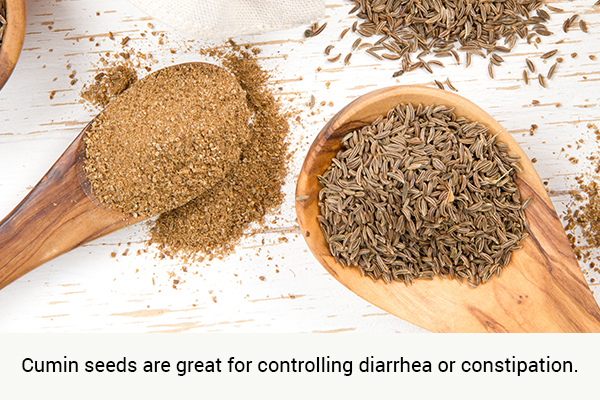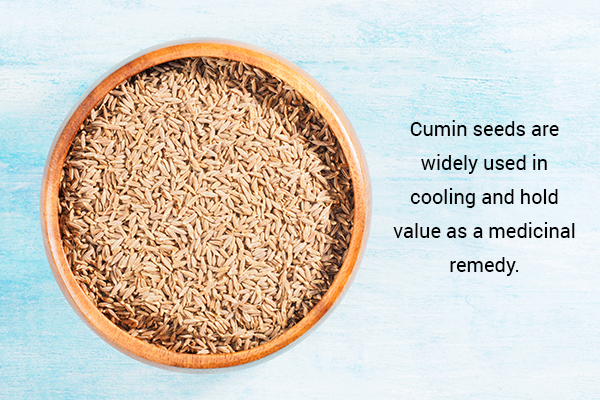In this article:
Starting the day off on the right foot will help you set yourself up for success. For this reason, many people consume certain beverages as part of their morning routine. Lemon water, chia seed water, and cumin water are some of the popular choices.

Widely used in traditional South Asian and Middle Eastern recipes, cumin is highly beneficial for promoting digestion, easing constipation, and relieving flatulence.
These slender, light-brown, tiny seeds also have medicinal properties such as reducing cholesterol levels, lowering blood sugar levels, controlling type 2 diabetes, and even preventing the risk of cancer. (1)
But just like anything in nature, cumin seeds should not be overconsumed at the risk of certain side effects.
Why You Should Limit Drinking Cumin Water
Cumin water is typically made in two ways:
- Soaking 1 teaspoon of cumin seeds overnight in half a glass of water. This is typically consumed first thing in the morning on an empty stomach.
- Boiling 1 teaspoon of cumin seeds in water and consuming a mugful of it after meals.
However, it is pertinent to remember that cumin is usually consumed in limited quantities, and it takes a large amount of cumin to cause undesirable side effects.
Here are some of the reasons you should not overconsume cumin water.
1. Heartburn
Cumin seeds are used to aid digestion and relieve flatulence and gas, but excessive use can push this gas back up through your food pipe and cause extreme discomfort. Occasionally, some acid may also travel up through the stomach and cause the feeling of heartburn or acidity. (2)
2. Miscarriages
Pregnant and breastfeeding women are discouraged from using cumin seeds as they can increase the risk of abortion, especially during the early stages of pregnancy. (3)
3. Low blood sugar levels (hypoglycemia)
Cumin seeds are considered potent agents that can reduce blood sugar levels in people with type 2 diabetes. However, excessive consumption of cumin (more than 2 g/kg of body weight) can cause excessive lowering of blood sugar levels, which can lead to hypoglycemia. (4)
4. Gastrointestinal disturbances

Cumin seeds are great for controlling diarrhea or constipation.
Studies have also found them to ease gastrointestinal movements in people with irritable bowel syndrome. However, in excessive amounts, it can also worsen or cause diarrhea and constipation. (5)
5. Nausea
Cumin, with its ability to manage gastrointestinal discomfort, can also relieve nausea. But overconsumption can lead to nausea as well. (5)
6. Infertility issues in men
Animal studies have found that cumin at significantly high daily doses can reduce the activity of testosterone and decrease the creation of sperm cells. The author of the study suggested that cumin can act as a potent male contraceptive. (6)
7. Liver damage
Some studies have suggested that high levels of cumin consumption can cause liver damage and even liver cancer. (3)
8. Allergies
Some people with allergies to cumin may experience contact dermatitis upon consuming high doses of cumin. (3)
Most-Asked Questions
What is the safe dose of cumin?
You can consume up to 2 teaspoons of cumin seeds in a day. Cumin oil and supplements are tolerated well in limits of less than 2 g/kg of body weight each day.
You can also consult a doctor to identify a safe dose for you.
Does excessive cumin intake cause heavy menstrual bleeding?
Though there is a lack of scientific evidence suggesting this, it is believed that excessive use of cumin or cumin oil can cause heavy blood flow during periods. Therefore, it is wise to limit cumin’s use either by itself or in the form of teas or concoctions.
Practical Takeaways

- Cumin seeds hold value as a popular medicinal remedy.
- Cumin is often used to relieve indigestion, constipation, and flatulence.
- While cumin is well tolerated at even large doses, extremely high doses can also cause side effects such as diarrhea, nausea, low blood sugar levels, allergy upon contact, miscarriages in women, reduced sperm levels in men, and even liver cancer.
- About 1–2 teaspoons of cumin is generally safe to consume daily.
- Was this article helpful?
- YES, THANKS!NOT REALLY


